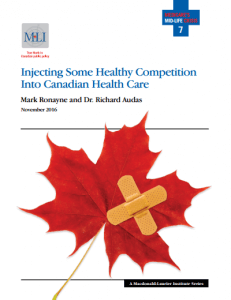
Greater competition – not more money – can help fix an expensive and underperforming health care system
OTTAWA, Nov. 22, 2016 – A little competition can be a good thing, particularly when it comes to Canadian health care.
A new paper from the Macdonald-Laurier Institute makes the case for using competition to improve an expensive and underperforming system so it works better for patients and costs less for Canadians.
“With the strains on the Canadian health care system showing as much as ever, injecting a little healthy competition into medicare should be part of the conversation around needed reforms”, write the authors, Mark Ronayne and Dr. Richard Audas.
 The authors find that measures to create competition in the provision of health services can lead to improved patient choice, better clinical outcomes, greater access to care, and improved efficiency and productivity.
The authors find that measures to create competition in the provision of health services can lead to improved patient choice, better clinical outcomes, greater access to care, and improved efficiency and productivity.
To read the full paper, titled “Injecting Some Healthy Competition Into Canadian Health Care”, click here.
While there are myriad opportunities for more competition in the health cares system, Ronayne and Audas concentrate on two key areas: hospitals and health professions. Together they combine to make up 54 percent of health care expenditures in Canada. But patients know little about the quality of services they provide, and so they cannot make an informed choice between providers. This needs to change, write Ronayne and Audas.
The United Kingdom provides an example of how increased competition among hospitals can make life better for patients. In 2006, the Labour government implemented a system whereby all referrals to hospital had to be accompanied with a choice of five options where individuals could have the service performed with the full cost being borne by the National Health Service, and the funding for the procedure following the individual. Patients could examine key performance metrics, as well as how long it would take before the procedure could be conducted, before making a decision.
“With the strains on the Canadian health care system showing as much as ever, injecting a little healthy competition into medicare should be part of the conversation around needed reforms” -Mark Ronayne and Dr. Richard Audas.
So if you prefer a short wait time for example, but are prepared to travel farther, you can choose to do so. This also means that high performing hospitals are financially rewarded. And it creates transparent performance standards that each patient can assess and evaluate to determine the facility that will provide the best-suited care for them. And most importantly, studies found that mortality declined, without increasing costs.
A shift toward “activity based funding”, or funding based on the procedures performed, in Canadian hospitals could facilitate this kind of competition.
There is also room for injecting more competition among health-care providers.
As technology and techniques improve, midwives, nurse practitioners and other health professionals can increasingly provide an equal or better service to doctors at significantly lower rates.
“Allowing different professional groups a greater opportunity to compete would encourage innovation and should result in as-good-to-better outcomes at a considerable cost savings”, write the authors.The keys to opening up competition between providers include ensuring regulatory bodies promote the interests of society rather than those of the professions, and ensuring provincial legislation allows for other qualified professionals to perform more tasks traditionally performed by doctors.
Finally, Canadian patients are woefully underserved when it comes to receiving information about the performance of hospitals and physicians. If patients are going to make health care providers compete for their business, they will need to be armed with the most up to date data on quality and access to care.
“Patients should demand more information and greater choice in their care,” write Audas and Ronayne. “And hospitals and providers shouldn’t be afraid of a little healthy competition.”
***
Mark Ronayne is an independent analyst and consultant on competition policy and law matters. He is a former Senior Competition Law Officer with the Canadian Competition Bureau.
Richard Audas, Ph.D. is an Associate Professor of Health Statistics and Economics at the Memorial University, Faculty of Medicine.
The Macdonald-Laurier Institute is the only non-partisan, independent national public policy think tank in Ottawa focusing on the full range of issues that fall under the jurisdiction of the federal government.
For more information, please contact Mark Brownlee, communications manager, at 613-482-8327 x105 or email at mark.brownlee@macdonaldlaurier.ca.




